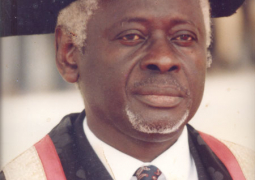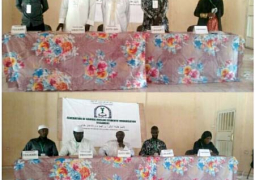The National Agricultural Research Institute (NARI), in collaboration with Plant Protection Services of the Ministry of Agriculture and the Gambia Growth and Competitiveness Project, on Wednesday began a week-long sensitisation of farmers on fruit-fly control.
On the first day, the sensitisation tour took the officials to the villages of Mandinari, Mandinaba, Busura and Darsilami to educate farmers on methods of fruit-fly control using success app at and malatrap.
Ismaila Mbenga, acting programme leader, Pest Management Programme of NARI, said there are a lot of technologies that farmers should know but are not aware of.
“This is why we feel by going out to them to sensitise them on the techniques to control pest will help in solving some of the problems cause by fruit-fly,” he said, adding that some of the control measures are available in-country.
Mr Mbenga explained that one method that farmers can use to reduce the waste due to fruit-fly is by picking the rotten fruit and bury it in a deep hole.
Momodou Lamin Touray of NARI said controlling fruit-fly is important because it impact the export trade.
“The amount of mangoes exported to the European market is so much but because of the fruit-fly it is going down now,” he said.“This is why the government feels it is important that ways and means are provided to farmers to arrest the spoilage.”
Mr Touray noted that export provides a country with foreign currency and mangoes are one of the export products of The Gambia to the European market.
“Therefore it is important that farmers are informed on fruit-fly control measures,” he said.
The NARI official explained that a female fruit-fly lays eggs on mango fruit and as the egg hatches it become a maggot which will later get in the mango and cause it to fall.
“As the maggot develops the mango fall on the ground where the maggot will hatch and emerge again and start flying,” Mr Touray explained.“The developmental period to maturity is 3 - 4 weeks.Fruit-fly produces 8 -10 generations per year.”
Jerreh Manneh, principal Plant Pathologist at Plant Protection Unit, said the integrated approach of village to village farmer sensitisation on fruit-fly “is very good and effective”.
He said they demonstrate to farmers how to use “simple technology” to control fruit-fly.
Kebba Bojang, a farmer at Mandinari village, commended NARI for coming up with the method, saying it will not only help reduce the wastage caused by fruit-fly but also increase their harvest and earning.
For him, fruit-fly is a problem for all Gambian farmers.
Bubacarr Sillah, also farmer at Mandinari, commended NARI for the initiative while calling on the government to give more support to NARI to eradicate fruit-fly in The Gambia.
Alagie Jasseh, of Mandinba village, said eradicating fruit-fly will benefit both farmers and the nation, economically.
At Busura village, Abdoulie Sanneh said they had been hearing about the fruit-fly control method but did not know about it hitherto.
Ba
Foday Sano, a farmer at Mandinaba, said more support should be given to NARI to
make research on controlling bats for they are also “a big problem for
farmers”.



